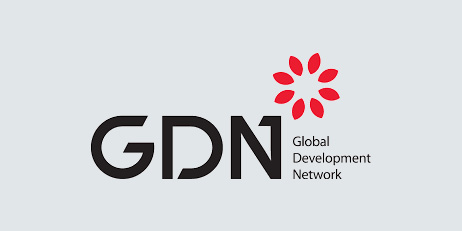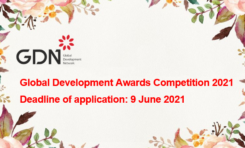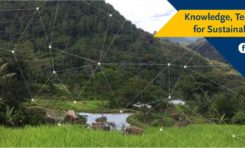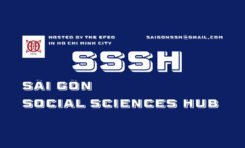Global Development Awards Competition
Japanese Award for Outstanding Research on Development 2020
Call for Research Proposals on “‘Unpacking the health-environment-economic wellbeing nexus”
CALL FOR RESEARCH PROPOSALS
Competition Theme
The Global Development Network (GDN) invites researchers from low-income or middle-income countries to submit research proposals within the theme, ‘Unpacking the health-environment-economic wellbeing nexus,’ for the Japanese Award for Outstanding Research on Development (ORD).
Proposals under this theme would look critically at policy successes and failures to look at the complex intersection of health, environment and economic wellbeing.
Research projects can focus on local, national, regional or continental policy initiatives, and come from any discipline within the social sciences. Proposals can focus on ongoing policy initiatives, past ones, or initiatives currently being set up.
A direct link to the COVID-19 crisis is welcome, but not required. In light of the quickly changing scenario, proposals that integrate a focus on COVID-19 and related policy responses must explain how the quickly changing policy landscape is likely to impact the focus of the research.
More information about the theme of the competition is available at the end of this document.
The Award
The Japanese Award for Outstanding Research on Development is a competitive research grant program under the Global Development Awards Competition 2020. The Awards Competition is administered by GDN and supported by the Ministry of Finance, Government of Japan. This award program identifies and funds outstanding research proposals in low-income or middle-income countries with high potential for excellence in research and clear policy implications for addressing development issues.
Since its inception in 2000, GDN has awarded roughly US$ 4 million in research and project grants to finalists and winners. Nearly 8,800 researchers and development practitioners from low-income or middle-income countries have participated in the competition and more than 200 awards have been conferred till date.
The three winning projects will receive grants worth US$ 45,000. In light of current Covid19 crisis and related travel limitations, the selection will be conducted online. Finalists will be invited to join a communications training in preparation of a pitch of their project in front of a high-level Jury, which will decide which research proposal to award. A physical Award ceremony might be held in 2021, if conditions allow it, but projects are expected to start on 15 Jan 2021. The awards will be given to the organization(s) or researcher(s) whose proposals hold the greatest promise for improving our understanding of development issues and puts forth clear, articulate and well researched policy implications to address relevant development problems.
The first prize winner will receive a grant of US$ 30,000. The second prize and third prize winners will receive a grant of US$ 10,000 and US$ 5,000 respectively. The funds will be used to support the research work proposed by the winners towards the completion of their research. Additionally, awardees will be paired with world-class academic in their area of work who will play the role of a Scientific and Technical Advisor to the winners.
The last date for submission of the online registration form, full research proposal in the application template and CVs of applicants (research team members) is 30 September 2020 (Indian Standard Time 6:00 PM).
Important Dates
- Deadline for submissions: 30 September 2020
- Announcement of Eligibility screening results: 2 October 2020
- Announcement of First Level review results (shortlisted applications) and comments from reviewers: 30 October 2020
- Resubmission of updated application for shortlisted applications: 8 November 2020
- Announcement of Second Level review results (finalists) and comments from reviewers: 4 December 2020
- Resubmission of updated application of the finalists: 11 December 2020
- Online Communications training: 7-11 December 2020
- Jury presentation: 14-18 December 2020 (specific date to be announced)
- Announcement of winners: 20 December 2020
Finalists are expected to be available during the following periods:
- 7-11 December 2020 – Communications training to take place online
- 14-18 December (specific date to be announced) for the presentation of their projects to the jury
Competition Rules and Guidelines
Please review carefully. Any application that does not follow the below mentioned
guidelines will NOT be considered.
A. General Rules
- Please note that the submission of all documents is mandatory for your application to be treated as complete and eligible.
- For a joint research proposal with more than one researcher, only the principal investigator should submit an application. However, the institutional affiliation, position/designation, e-mail address, citizenship and current residence of each coresearcher MUST also be included in the application.
- The application and the required documents must be submitted as electronic files at GDN’s online submission platform (www.gdn.int/awardsplatform). Please note that GDN accepts applications through the online submission platform EXCLUSIVELY.
- Research proposals should be submitted only in the designated application template.
- The Proposal Template must not exceed 20 pages. Format should be in Calibri, 11-point font with single line spacing and one-inch margins.
- An application can be submitted by an individual researcher or by a team of researchers. In cases with more than one researcher, all researchers must meet the eligibility criteria.
- All applications must be accompanied by CVs of all the team members.
- Proposals must be submitted in the English language only.
- Incomplete applications will NOT be considered.
- Please note that all forms of academic dishonesty are unacceptable to GDN, plagiarism being one of them including self-plagiarism. Plagiarism is unauthorized use of other people’s work, ideas and/or writings (in part or in full) and presenting or giving notion of these work(s), ideas and/or writings being one’s own work, idea(s) and/or writing(s). GDN takes plagiarism very seriously and will take immediate and appropriate action including and not limited to withdrawal of funding for any such grantees found guilty of plagiarism.
- Please note that all personal information details provided in the application (along with the CV) should be correct, else the application will be liable for disqualification at any stage of the competition, including after the grant has been conferred.
- The three finalists will present their work at an online event hosted by GDN between 14-18 December 2020 and are expected to attend the online Communication training scheduled to take place between the 7-11 December
2020.
B. Eligibility Criteria
- Eligible countries for the ORD competition are those classified by the World Bank as low-income or middle-income countries1. The competition is open only to researchers who are citizens or permanent residents of these countries. The applicants (including team members) can be asked to submit proof of their citizenship and residency through documents with legal standing, at any point during the competition. Please note that all personal information details as provided in the application (and CV) should be factually correct, else the application will be liable for disqualification. The information on the Identity Card will remain strictly confidential with GDN.
- Citizens of eligible countries currently residing in a non-eligible country are only allowed to apply if they have been living in the non-eligible country for no more than five years as of 20 July 2020. This should be clearly shown as in the CV and personal information should be provided. In case any information is found to be incorrect, the proposal is liable for disqualification during any stage of the competition, including after the grant has been conferred.
- CVs for all team members must be included in the application. The CVs should clearly state the age of all team members, the citizenships for all team members and the country of residence for the past five years for all team members and the current institutional affiliations for all team members. These details are mandatory, and an application will be deemed incomplete if these details are not submitted.
- The upper age limit for all applicants is 45 years as of 20 July 2020. Individuals above 45 years of age as of 20 July 2020 are not eligible to apply.
- The proposal should not be receiving or scheduled to receive funds from other sources to be eligible for consideration for the ORD unless it is clearly explained how the additional funds provided by the ORD would reinforce the existing funds for successful completion of the research.
- Staff members of multilateral and bilateral organizations (The World Bank, IMF, IADB, UN agencies, UKAid , etc.) are not eligible to apply.
- Previous and current employees of GDN or its Regional Network Partners2 are not eligible to apply up till 5 years from the completion of their tenure. Previous GDN Board Members, project mentors and members of evaluation teams are not eligible to apply.
- Similar proposals or papers resulting as products from full or partial GDN funded activities (Global Research Projects and other competitions not limited to Regional Research Competitions, Global Research Competitions etc.), cannot be submitted for this competition.
- Past ORD winners and finalists are not eligible to apply with the same or similar research proposal. Additionally, winners are not eligible to apply for a period of 3 years subsequent to the end of their agreement with GDN.
- Past and current ORD reviewers are not eligible to take part in the competition.
1 Please visit the following link for the list of countries which are recognized as low and middle income countries: data.worldbank.org/about/country-and-lending-groups
2 www.gdn.int/regional-network-partners
C. How to Apply
Follow the steps given below:
- Prepare your Application
- Proposal Template – Download the proposal template document available here. Fill it in and save it on your computer in .doc, .docx or .pdf format for upload.
- Organization Profile – Prepare a document providing the profile (up to 1 page) of your organization (if any) and save it on your computer in .doc, .docx or .pdf format for upload.
- CVs of the research team – Collect all the CVs of the different team members, matching the name of the documents per role in the proposal (PI for Principal Investigator and CR for Co-Researchers) and compress them into a .zip, .rar or similar type of files.
- Submit your application on the Online Application Form
- Follow to GDN’s dedicated online submission platform using the following link: www.gdn.int/awardsplatform
- Register or Log in into the platform to have access to your profile. You will receive an email confirming the successful registration of your profile and only after verifying your profile, will you be able to submit an application.
- a. Take note that you will have to accept the terms and conditions of the Awards Force platform as well as the terms and conditions of the Global Development Awards Competition which state every aspect available on the Call for Proposals.
- On your profile page, you will have access to My entries where you may either resume (selecting the entry you would like to continue from the list) or start entry. Select “Call for Proposals” under Category.
- b. In case you need to exit the application and complete it at a later time, click on Save + Close. You may return and complete your application on the online platform before the closing date (30 September 2020) but it will be considered as submitted only if you press Submit Entry.
- c. Take note that you will be able to resume your entry at any time up to the deadline. If there are duplicate entries, the most recent one will be considered as only one proposal per applicant is allowed.
- You will be asked to provide the details of the proposal and applicable personal details of each member of the research team.
- Upload your proposal, organizational profile and CV’s on the Attachments tab, one at a time.
- Once you have completed your application, click on Submit Entry. You will receive an email notifying you on the successful submission of your application.
The last date for submission of the online registration form, the full research proposal in the application template and CVs of the applicants is 30 September 2020 (Indian Standard Time 6:00 PM).
- Review Criteria
Throughout the review process, the proposals will be judged on the following criteria:- Potential for a substantive contribution to a particular aspect of research literature on the topic of the current edition.
- Innovative value of the research topic and the methodology proposed
- Academic quality of the proposal (including quality of referencing, clarity of research questions, appropriateness of methodology)
- Clarity of the links to policy (at the level of concept definition, operationalization, critical review or evaluation) for addressing specific development issues
- Composition of the research team and the cost-effectiveness of the budget proposed
D. Selection Process
Once the submission of proposals is closed, a multi-stage review process will be used to select the winners. The review process will follow the blind review process wherein identities of the authors and reviewers will be concealed to eliminate any selection bias. The proposals will be reviewed at all stages on the basis of the review criteria given in the next section.
- In the first stage, a preliminary assessment will be undertaken by GDN staff to check for eligibility, originality and coherence.
- The eligible applications are then reviewed by external scholars in two steps. At a first step, Lot 1: First level review, reviewers will be selected to conduct a first assessment of proposals on the basis of the ORD selection criteria and shortlist the best proposals. The shortlisted applicants received the comments from the reviewers and are allowed to update their proposals. At the second step, Lot 2: Expert level review, experienced researchers review the shortlisted proposals, and select the three finalists of the ORD category. The final ranking is validated by the Panel Organizer, selected based on her/his professional experience from the Lot 2 reviewers. The names of the three finalists will be announced by early December 2020.
- The three finalists will present their work at an online event hosted by GDN between 14-18 December 2020 and are expected to attend the onlineCommunication training scheduled to take place between the 7-11 December 2020.
- The final selection of proposals will be undertaken by a Scientific Committee (Jury)
in the last and final stage at the online event. The decision of the jury will be final.
E. Terms and Conditions
- GDN reserves the right not to grant one or more than one Award.
- GDN reserves the right to modify, cancel or not award grants at any stage of the competition and grant-making.
- Cancellation of the Award: The Award is liable to cancellation in case of unsatisfactory progress of research work and if any of the researchers in the award team are found ineligible later.
- GDN will award the funds to winners through a written grant agreement.
Selection Committee
The Selection Committee for this year’s competition has not yet been determined. Past Selection Committees have included distinguished scholars and representatives from the following organizations:
- ANU – Australia’s National University, Australia
- Ateneo de Manila University, Philippines
- CEDLAS – Universidad Nacional de La Plata, Argentina
- Czech National Bank, Czech Republic
- EADI – European Association of Development, Research and Training Institutes, Germany
- FERDI – Foundation for studies and Research on International Development, France
- Harvard University, USA
- IIDS – Institute for Integrated Development Studies , Nepal
- INASP-International Network for the Availability of Scientific Publications, United Kingdom
- Institute of Social Studies, The Netherlands Inter-American Dialogue, USA
- James Cook University, Australia
- KOICA – Korean International Cooperation Agency, Republic of Korea
- National Agricultural Research Institute of Tunisia, Tunisia
- South Eastern European University,
- Republic of Macedonia
- Tallinn University, Estonia
- The Netherlands Institute of Social Research, The Hague, The Netherlands
- The Vienna Institute for International Economic Studies, Austria
- The World Bank
- Tulane University, USA
- Veolia Environment Institute, France
- West and Central African Council for Agricultural Research and Development (WECARD), SenegalAteneo de Manila University, Philippines
Description | 2020 Global Development Awards Competition Theme
“The world must embrace a recovery that involves sustainable farming and clean energy.
Anything else is a false economy”
Marco Lamertini (WWF International), Elizabeth Maruma Mrema (UN Convention on Biological
Diversity) and Maria Neira (World Health Organization). The Guardian, 17 June 20203
The current COVID-19 pandemic has brought into the spotlight the links between extreme environmental pressure, unsustainable economic activity and public health emergencies. Before COVID-19, Yellow Fever, Malaria, Venezuelan Equine Encephalitis, the Nipah virus and Ebola, as well as 75% of all infectious diseases,4 are believed by scientists to have originated from wildlife facing extreme environmental conditions, partly and at times largely driven by economic activity. What is currently being lived as a ‘critical event’ (to borrow the language of Indian sociologist Veena Das5), might be best described as a longannounced, simmering crisis, as many authoritative voices have stressed.6
Calls for renewed and courageous political action, and an overhaul in policy approaches to navigate the crisis, are close to ubiquitous. Yet, little is known about how to effectively address the links between health, environment and economic wellbeing, except the fact that the nexus ‘presents multiple convoluted challenges at national, regional, continental, and global levels’.7 Questions relate both to the nature of this nexus, and to the kind of policy processes and initiatives that might address it effectively.
The 2020 edition of the Global Development Network’s Japanese Awards for Outstanding Research on Development calls for early and mid-career researchers based in low-income or middle-income countries to develop original research that can document and analyze policy efforts that address the links between health, environment and economic wellbeing, with a critical eye to illuminating both successes and failures. Any policy initiative identified must necessarily have direct links to all three areas as research proposals within the Competition’s theme: Unpacking the health-environment economic wellbeing nexus.
In all cases, proposals should demonstrate the potential of the research project to generate critical insight for the design of policy processes, the political economy of decision-making, the role of evidence in policy debates and decision, and policy evaluation. Proposals should discuss the proposed research question and methodology not only in light of their academic relevance, but also in light of their potential to contribute to stronger public debate and action in the future.
Research proposals falling within the following macro-policy areas are welcome (this list is indicative but not exclusive):
- Biodiversity Mainstreaming
- Climate Change Adaptation
- Valuation and Management of Ecosystems and Ecosystem Services
- Human-wildlife conflicts
- Disaster Recovery
- Extreme Poverty Alleviation
- Ecological Transition
Research projects can focus on local, national, regional or continental policy initiatives, and come from any discipline within the social sciences. Proposals can focus on ongoing policy initiatives, past ones, or initiatives currently being set up.
A direct link to the COVID-19 crisis is welcome, but not required. In light of the quickly changing scenario, proposals that integrate a focus on COVID-19 and related policy responses must explain how the quickly changing policy landscape is likely to impact the focus of the research.
Impact of the Pandemic
All research proposals must include an analysis of risks for the proposed research linked to existing restrictions to movement and other restrictions linked to pandemic response in the relevant geographical areas.
3 Lambertini, Marco, Elizabeth Maruma Mrema, and Maria Neira. ‘Coronavirus Is a Warning to Us to Mend Our Broken Relationship with Nature | Marco Lambertini, Elizabeth Maruma Mrema and Maria Neira’. The Guardian, 17 June 2020, sec. Opinion. www.theguardian.com/commentisfree/2020/jun/17/coronavirus-warning-broken-relationship-nature.
4 pubmed.ncbi.nlm.nih.gov/11516376/
5 Das, Veena. Critical Events: An Anthropological Perspective on Contemporary India. Vol. 7. Oxford University Press Delhi, 1995.
6 Damian Carrington. ‘Coronavirus: ‘Nature Is Sending Us a Message’, Says UN Environment Chief’. The Guardian, 25 March 2020, sec. World news. www.theguardian.com/world/2020/mar/25/coronavirus-nature-is-sending-us-a-message-says-un-environment-chief.
7 Cerf, Marlon E. ‘Sustainable Development Goal Integration, Interdependence, and Implementation: The Environment–Economic–Health Nexus and Universal Health Coverage’. Global Challenges 3, no. 9 (29 April 2019). doi.org/10.1002/gch2.201900021.
Official website: http://www.gdn.int/Awards2020






